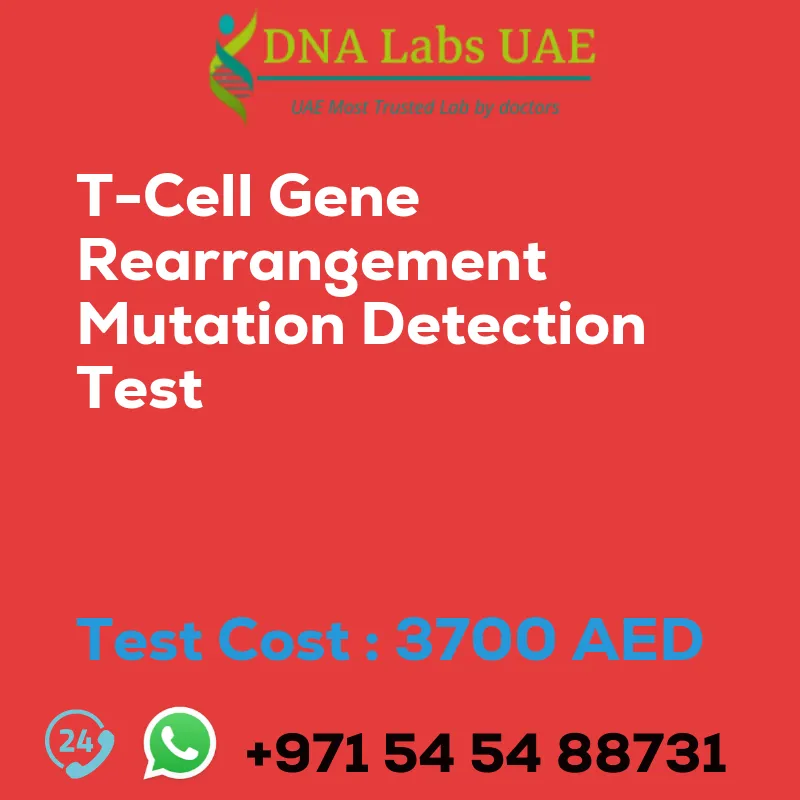T-CELL GENE REARRANGEMENT MUTATION DETECTION Test
Introduction
T-cell gene rearrangement mutation detection test is a diagnostic tool used to identify genetic mutations in T-cell receptor (TCR) genes. TCR genes play a crucial role in the development and function of T-cells, which are a type of white blood cell involved in the immune response.
Test Details
This test is primarily used in the diagnosis and monitoring of T-cell lymphomas, a type of cancer that affects T-cells. T-cell lymphomas often involve genetic mutations or rearrangements in TCR genes, which can be detected using this test.
The test involves analyzing the DNA or RNA extracted from a patient’s blood or tissue sample. Various techniques such as polymerase chain reaction (PCR), DNA sequencing, or fluorescent in situ hybridization (FISH) may be used to detect the presence of gene rearrangements or mutations in TCR genes.
Test Components
- Price: 3700.0 AED
- Sample Condition: 4 mL (2 mL min.) whole blood in 1 Lavender top (EDTA) tube. Ship refrigerated. DO NOT FREEZE.
- Duly filled Genomics Clinical Information Requisition Form (Form 20) is mandatory.
Report Delivery
15 working days
Method
PCR
Test Type
Cancer
Doctor
Oncologist
Test Department
Molecular Diagnostics
Pre Test Information
Duly filled Genomics Clinical Information Requisition Form (Form 20) is mandatory.
Conclusion
By identifying genetic abnormalities in TCR genes, the T-cell gene rearrangement mutation detection test helps in confirming the diagnosis of T-cell lymphoma and determining the subtype of the disease. It also aids in monitoring the progression of the disease and evaluating the response to treatment. Overall, this test plays a vital role in the accurate diagnosis and management of T-cell lymphomas, facilitating personalized treatment approaches for patients.
| Test Name | T-CELL GENE REARRANGEMENT MUTATION DETECTION Test |
|---|---|
| Components | |
| Price | 3700.0 AED |
| Sample Condition | 4 mL (2 mL min.) whole blood in 1 Lavender top (EDTA) tube. Ship refrigerated. DO NOT FREEZE. Duly filled Genomics Clinical Information Requisition Form (Form 20) is mandatory. |
| Report Delivery | 15 working days |
| Method | PCR |
| Test type | Cancer |
| Doctor | Oncologist |
| Test Department: | MOLECULAR DIAGNOSTICS |
| Pre Test Information | Duly filled Genomics Clinical Information Requisition Form (Form 20) is mandatory. |
| Test Details | T-cell gene rearrangement mutation detection test is a diagnostic tool used to identify genetic mutations in T-cell receptor (TCR) genes. TCR genes play a crucial role in the development and function of T-cells, which are a type of white blood cell involved in the immune response. This test is primarily used in the diagnosis and monitoring of T-cell lymphomas, a type of cancer that affects T-cells. T-cell lymphomas often involve genetic mutations or rearrangements in TCR genes, which can be detected using this test. The test involves analyzing the DNA or RNA extracted from a patient’s blood or tissue sample. Various techniques such as polymerase chain reaction (PCR), DNA sequencing, or fluorescent in situ hybridization (FISH) may be used to detect the presence of gene rearrangements or mutations in TCR genes. By identifying these genetic abnormalities, the test helps in confirming the diagnosis of T-cell lymphoma and determining the subtype of the disease. It also aids in monitoring the progression of the disease and evaluating the response to treatment. Overall, T-cell gene rearrangement mutation detection test plays a vital role in the accurate diagnosis and management of T-cell lymphomas, facilitating personalized treatment approaches for patients. |







